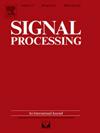线谱估计无限传感
IF 3.6
2区 工程技术
Q2 ENGINEERING, ELECTRICAL & ELECTRONIC
引用次数: 0
摘要
在本文中,我们考虑了无限传感框架(USF)下的线谱估计问题,在无限传感框架中,使用模数模数转换器(ADC)在量化前将输入信号折叠回有界区间。这样的运算在数学上等价于对输入信号对区间取模。为了克服基于高阶差分方法的噪声敏感性,研究了模样本的一阶差分特性,提出了两种基于一阶差分的线谱估计算法,并对噪声具有鲁棒性。具体地说,我们证明,在高概率下,原始样本的一阶差分等于模样本的一阶差分。利用这一特性,采用鲁棒稀疏信号恢复方法求解线谱估计。第二种算法是基于我们的发现,在足够高的采样率下,原始样本的一阶差分可以分解为模样本的一阶差分和一个元素被限制为三个可能值的序列。这种分解使我们能够将线谱估计问题表述为一个可以有效求解的混合整数线性规划。仿真结果表明,两种方法对噪声都有较强的鲁棒性,且性能比基于高阶差分的方法有显著提高。方法。本文章由计算机程序翻译,如有差异,请以英文原文为准。
Line spectral estimation with unlimited sensing
In the paper, we consider the line spectral estimation problem in an unlimited sensing framework (USF), where a modulo analog-to-digital converter (ADC) is employed to fold the input signal back into a bounded interval before quantization. Such an operation is mathematically equivalent to taking the modulo of the input signal with respect to the interval. To overcome the noise sensitivity of higher-order difference-based methods, we explore the properties of the first-order difference of modulo samples, and develop two line spectral estimation algorithms based on the first-order difference, which are robust against noise. Specifically, we show that, with a high probability, the first-order difference of the original samples is equivalent to that of the modulo samples. By utilizing this property, line spectral estimation is solved via a robust sparse signal recovery approach. The second algorithms is built on our finding that, with a sufficiently high sampling rate, the first-order difference of the original samples can be decomposed as a sum of the first-order difference of the modulo samples and a sequence whose elements are confined to three possible values. This decomposition enables us to formulate the line spectral estimation problem as a mixed integer linear program that can be efficiently solved. Simulation results show that both proposed methods are robust against noise and achieve a significant performance improvement over the higher-order difference-based method. methods.
求助全文
通过发布文献求助,成功后即可免费获取论文全文。
去求助
来源期刊

Signal Processing
工程技术-工程:电子与电气
CiteScore
9.20
自引率
9.10%
发文量
309
审稿时长
41 days
期刊介绍:
Signal Processing incorporates all aspects of the theory and practice of signal processing. It features original research work, tutorial and review articles, and accounts of practical developments. It is intended for a rapid dissemination of knowledge and experience to engineers and scientists working in the research, development or practical application of signal processing.
Subject areas covered by the journal include: Signal Theory; Stochastic Processes; Detection and Estimation; Spectral Analysis; Filtering; Signal Processing Systems; Software Developments; Image Processing; Pattern Recognition; Optical Signal Processing; Digital Signal Processing; Multi-dimensional Signal Processing; Communication Signal Processing; Biomedical Signal Processing; Geophysical and Astrophysical Signal Processing; Earth Resources Signal Processing; Acoustic and Vibration Signal Processing; Data Processing; Remote Sensing; Signal Processing Technology; Radar Signal Processing; Sonar Signal Processing; Industrial Applications; New Applications.
 求助内容:
求助内容: 应助结果提醒方式:
应助结果提醒方式:


